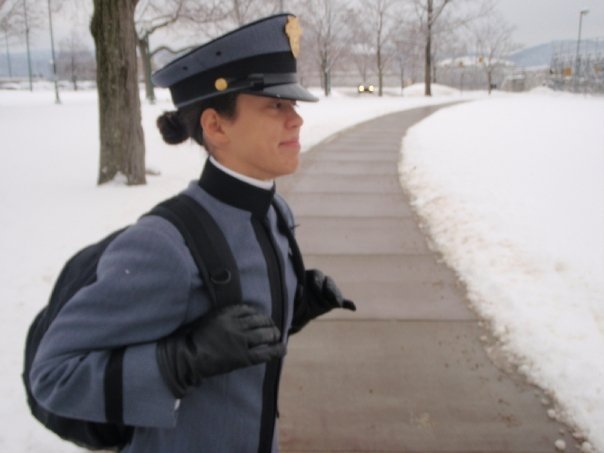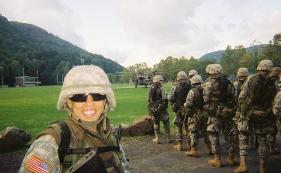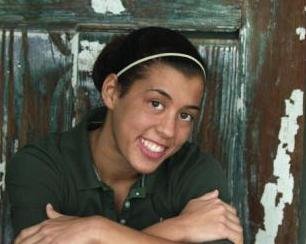I thumbed through the myriad
of college information packets I received in
the mail. I was 16 years of age, preparing to enter
my junior year of high school, and completely
directionless when it came to my post-secondary
education plans. That is, until I stumbled upon a
pamphlet with a strong woman standing before - and
very apparently commanding - a sea of men and women
dressed in grey uniforms. I was not simply
intrigued; it was much more than that. I felt that
in glancing at that picture I had learned something
deeply personal about myself. In retrospect, I can
say confidently that my directionless, teenage self
was awe-struck and inspired. I opened
the packet and studied the featured content.
"Duty - Honor - Country. These
three hallowed words reverently dictate what you
ought to be, what you can be, what you will be."-
Douglas MacArthur, 1962
The words echoed in my head
long after I was done reading them. I suddenly
appreciated the concepts of personal, holistic
development that would benefit a cause far greater
than myself. And in that exact moment, I wanted
nothing more than to attend West Point, commission
as a second lieutenant, and lead soldiers in the
world's finest military. Nothing was going to derail
my efforts in accomplishing this.
 |
My junior and
senior year of high school I developed
myself academically, physically, and
militarily to prepare for the rigors of
cadet life. I lifted with a strength
coach three times a week and joined the
cross-country team for endurance
training. I applied military concepts to
every class assignment I received. I
sought mentorship from community leaders
so I could start forming my own
leadership style. And a few months
later, I would choose to suppress the
sexuality I had finally come to terms
with. It simply did not fit in with my
life plans, and I viewed it as another
conquerable obstacle in preparation for
military service. |
The academy recognized my
efforts and rendered me an appointment in January
2008. I reported for Cadet Basic Training (CBT)
three weeks after I graduated with honors from
Findlay High School.

The first major training event
my company was scheduled to complete was repelling
from a 75 foot cliff with nothing but a rope and
caribbeaner. I was preoccupied with my own fear of
heights as I positioned myself on the edge when I
noticed a cadet in the lane parallel to mine
struggling. She grasped the rope, quite literally,
for dear life. I could see her forearms trembling
and her lower lip quivering from a few feet away. In
seeing my fellow platoon-mate in such a state, I
instinctively concerned myself with her well-being
in place of my own. "You're going to be alright.
We're going to do this together," I encouraged her
with confidence that surprised even myself. She
locked on my eyes for a second then nodded in
understanding. Two minutes later we reached the
bottom of the cliff, side by side.
 |
General
Petreaus once said “The military isn’t
about people; it is people.”
After having such a genuine,
human-to-human interaction with the
cadet during the repel, I knew I was in
the right profession, the profession of
leading people. |
But not all of CBT was about
bonding through adrenaline-pumping moments. It
resembled much more personal, social moments
punctuated by these rather intense training
experiences. I resided in the same barracks, ate
meals with, and attended briefings with my company
mates. We were cadets, but we were also more than
that; we were friends. And it was in these
situations I found my integrity most compromised. I
deliberately avoided speaking about my personal
life. But inevitably, the topic arose. Suspicious of
my overt aversion to discussing this, I began to lie
about my past relationships to my friends. Sometimes
this included referring to my most recent girlfriend
as "Kris" instead of "Kristin" and substituting the
appropriate gender pronouns. Other times I found it
necessary to create a more elaborate heterosexual
dating history to cover up my sexual orientation.
This false identity compromised the basic
human-to-human interaction that drew me to the
military in the first place. I could feel the bonds
deteriorating between my comrades and me as I
submerged myself in a whirlwind of equivocation and
deceit. I found myself unable to form genuine
relationships, and as a result, unable to become the
soldier and the leader I so aspired to be.
After two years at West Point,
a contract must be signed that commits cadet to
seven more years in uniform. The ambivalence was
overbearing, but I was forced to make a choice:
commit or resign. So on Friday, 13AUG2010 I was
honorably discharged from the military. There was no
sigh of relief. There was no enlightened feeling
from the restoration of my integrity. I had just
resigned from the academy I had dreamed of attending
since I was 16. But as torn I was, I knew I was
doing the right thing.
I will be attending Yale
University in the fall to continue my intellectual
development, my political activism, and my self
-exploration. I anticipate my experience there being
rewarding in its own respect. But every day I will
look forward to the prospect of DADT repeal because
that will be the day I return to the military to
serve proudly in the U.S. Army Officer Corps, just
as I had aspired when I opened that pamphlet in the
mail four years ago.

© 2010 Gay Military Signal